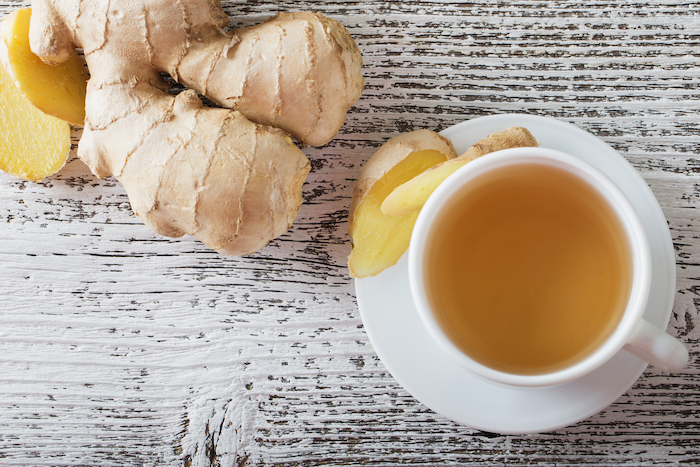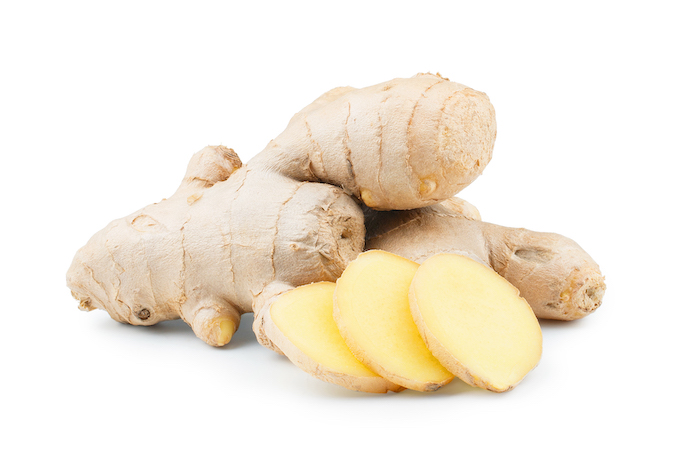You may already know a little something about the health benefits of ginger. Ever sip on ginger ale when you had a bellyache as a kid?
It wasn’t only the bubbles that may have calmed your tummy; the spicy ginger likely helped, too! Ginger, also known as Zingiber officinale, is a magical spice that’s been around for centuries.
“The list of medicinal benefits of ginger is long and varied,” says Dr. Heather Tynan, ND.
This relative of turmeric may help to ease nausea, quell indigestion, and keep you from losing your breakfast. Beyond your gut, ginger may boast a bunch of other great benefits, all with practically no side effects.
1. Antioxidant-like compounds
Ginger is a healthy spice that contains two major compounds — gingerols and shogaols — both of which exhibit antioxidant-like effects. These same natural oils are largely responsible for giving ginger its signature spicy taste.
Trista Best, a nutritionist and registered dietitian, recommends opting for ginger tea over coffee or other flavored teas.
“It’s an easy addition to your current health regimen and daily routine,” she says, “without losing the flavor and warmth of other hot beverages you’d be enjoying otherwise.”
2. Temporary Nausea and bloating
Next time you’re feeling queasy or gassy, brew up some ginger tea or grab a ginger chew. It not only could potentially soothe the smooth muscles of the digestive tract and reduce gas, but it may also help prevent temporary nausea, Tynan says.
According to researchers, ginger appears to aid common motion sickness compared with a placebo.
3. Morning sickness

Ginger may even help reduce dreaded morning sickness. A 2019 study found ginger potentially effective in improving nausea and vomiting in pregnant women and helped relieve the severity of nausea. Further, a 2013 research review determined that ginger may be “safe and effective” during pregnancy.
Still, Tynan recommends taking ginger “in food form or as a tea rather than in a concentrated extract.” More research is needed, and pregnant women should speak with a doctor before supplementing with ginger.
4. Muscle pain and soreness
If you’re in the habit of popping NSAIDs after a workout, you might want to try ginger instead. A 2015 review in the Journal of Strength and Conditioning Research found that ingesting 2 g of ginger per day for one to two weeks can significantly reduce exercise-induced muscle soreness from resistance training and prolonged cardio workouts.
That finding was reflected in another study in The Journal of Pain. The researchers found that when taken regularly, ginger can help reduce exercise-induced muscle soreness the day after a tough arm workout.
Researchers add that more study is needed to evaluate ginger as an analgesic for a wide range of athletic endeavors.
5. Joint health

Both Ayurveda, the traditional medical system of India, and Traditional Chinese Medicine commonly use ginger for joint support, Tynan explains. She says that, due to its spiciness, ginger is a “warming” herb that “alleviates joint discomfort due to cold (weather).”
Studies back this traditional use: A 2016 randomized controlled clinical trial found consuming 500 mg of ginger capsules showed “promising benefits” for supporting joint health.
Another experimental study the following year suggested massaging painful knees with ginger oil could be easy and effective.
Since responses to supplements vary by individual, it’s best to discuss the safety and dosing with your physician. Researchers noted that more studies are needed.
6. Indigestion
Instead of downing antacids after you eat, try swapping in ginger. Compounds found in ginger are known to help ease irritation of the stomach, says Carrie Lam, MD, and help with bile production and stimulate saliva for better digestion.
Studies agree, finding that ginger can help calm intestinal cramping, general indigestion, flatulence, and bloating. Try adding some ginger to any meals that might cause you some discomfort and eat some freshly sliced ginger after a heavy meal.
“Ginger aids digestion essentially from start to finish,” Tynan says.
She adds that ginger may stimulate your appetite, might get your digestive juices flowing, and could potentially help distribute nutrients. When your digestion feels sluggish, ginger may have the potential to take away that weighty feeling, as it may be associated with faster “gastric emptying,” says registered dietitian Tina Marinaccio, MS, RD, CPT.
7. Menstrual cramps
Taking ginger in the first three to four days of the menstrual cycle may have the potential to help modestly reduce pain, Marinaccio says.
Ginger may ease moderate cramps because, Tynan says, the herb may help to reduce spasms of smooth muscles — like the uterus.
Researchers concluded, “Further studies regarding the effects of ginger on other symptoms associated with dysmenorrhea and efficacy and safety of various doses and treatment durations of ginger are warranted.”
How to Consume Ginger

As one of the most common dietary supplements, ginger is as versatile as it is beneficial.
The best way to take is the one “that is most convenient and palatable to you,” Tynan says.
- Nibble on slices of pickled ginger as a palate cleanser.
- Brew a cup of ginger tea after a big meal.
- Blend fresh or dried ginger into smoothies or juice.
- Grate a hunk into stir-fries and soups.
- Chew on dried ginger for a sweet treat.
- Add grated fresh ginger to your lemon water in the morning.
- Suck on a ginger lozenge when you travel.
- Take tinctures or capsules for a more potent punch.
What to Look for When Buying Ginger
Anytime you shop for a supplement, consider these questions:
- How is the supplement produced?
- Is it processed without harmful solvents or other additives?
- Is the manufacturer reputable?
- Do they offer proof of the tests they perform (including verification that what’s on the label is really what you’re buying)?
- Are they making claims that sound too good to be true?
Keep in mind that supplement companies have to abide by regulatory standards for their claims, which are enforced by the U.S. Food and Drug Administration and the Federal Trade Commission.

